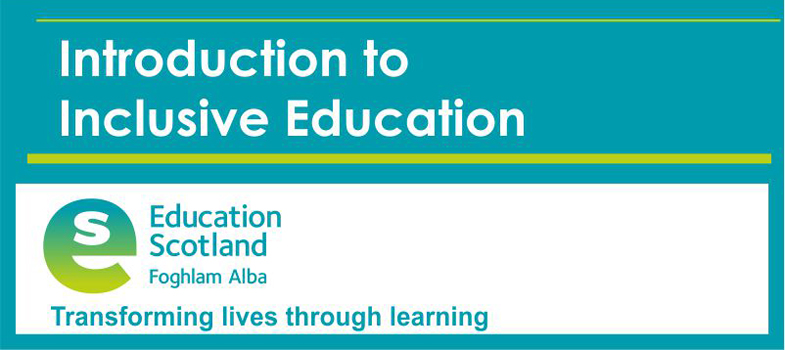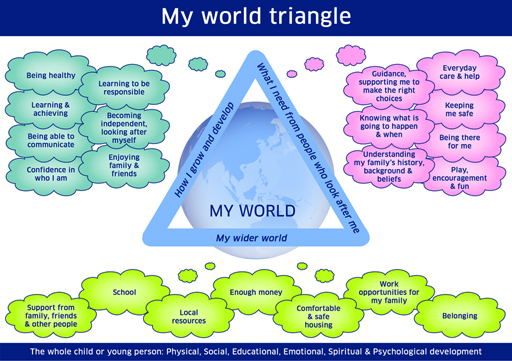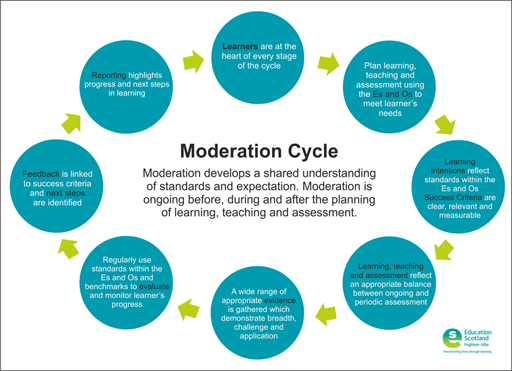3.4 Assessment and monitoring of additional support needs
Assessment is a dynamic process, with the child or young person at the centre. As a result, it should not be divorced from other aspects of the child’s life either at school, home or in the community as illustrated in the My World Triangle below in Figure 8.
The My World Triangle can be used to gather more information from a range of sources (some of it possibly specialist), to identify the strengths or wellbeing concerns in the child or young person’s world.
Further information on the My World Triangle can be accessed on the Scottish Government website. [Tip: hold Ctrl and click a link to open it in a new tab. (Hide tip)]
The Code of Practice (Third Edition) 2017, highlighted in section1.1 states that:
‘assessment is seen as an ongoing process of gathering, structuring and making sense of information about a child or young person, and his/her circumstances. The ultimate purpose of assessment under the Act is to help identify the actions required to maximise development and learning. Assessment plays a key role in the authority’s arrangements for identifying children and young people who have additional support needs and who, of those, require a coordinated support plan. Assessment is a process supported by professionals and parents in most circumstances. It identifies and builds on strengths, whilst taking account of needs and risks. The assessment process also assumes the negotiated sharing of information by relevant persons and agencies.’
The 2011 document ‘A Framework for Assessment Building the Curriculum 5 ’highlights that the purposes of assessment are to:
- Support learning that develops the knowledge and understanding, skills, attributes and capabilities which contribute to the four capacities
- Give assurance to parents, children themselves, and others, that children and young people are progressing in their learning and developing in line with expectations
- Provide a summary of what learners have achieved, including through qualifications and awards
- Contribute to planning the next stages of learning and help learners progress to further education, higher education and employment
- Inform future improvements in learning and teaching
Assessment is an integral part of learning and teaching which takes place in every classroom each day. It helps to provide a picture of a child’s or young person's progress and achievements and to identify next steps in learning. Assessment of a learner’s progress and achievement is based on a teacher’s assessment of their knowledge, understanding and skills in curriculum areas. Teachers assess learning using a variety of approaches and a wide range of evidence. The Moderation Cycle in Figure 9 outlines each stage of the moderation process and enables practitioners to develop a shared understanding of standards and expectations in the broad general education.
Engaging in the moderation process with colleagues will assist practitioners in arriving at valid and reliable decisions on learners’ progress towards, and achievement of, a level.
The principles for the assessment of additional support needs are no different to those for Curriculum for Excellence. Information which is gathered on a daily basis by class teachers as part of their curriculum moderation and assessment can provide a significant contribution to support assessment. The information gathered reflects the learner’s presentation in class and can include examples of:
- Observations
- Pieces of class work – examples of free handwriting to evaluate spelling, structure
- Conversations about barriers to learning
- Information shared by parents and the learner
Education Scotland’s statement for Practitioners(August 2016) stated that the two key resources which support practitioners to plan learning, teaching and assessment are the Experiencesand Outcomes (Es and Os) and Benchmarks.
Download The Aug 2016 statement for Practitioners
Experiences and outcomes are a set of clear and concise statements about children's learning and progression in each curriculum area. They are used to help plan learning and to assess progress.
Download the full set of experiences and outcomes
This document contains the experiences and outcomes for all curriculum areas.
By exploring the entire set of experiences and outcomes, you will be able to see the curriculum from the early years to the end of S3 as a whole.
Curriculum for Excellence Benchmarks
Benchmarks have been developed to provide clarity on the national standardsexpected within each curriculum area at each level. They set out clear lines of progression in literacy and English and numeracy and mathematics, and across all other curriculum areas from Early to Fourth Levels (First to Fourth Levels in Modern Languages). Their purpose is to make clear what learners need to know and be able to do to progress through the levels, and to support consistency in teachers' and other practitioners' professional judgements.
Further information on benchmarks can be accessed on the Education Scotland website.
3.3 Identifying additional support needs


